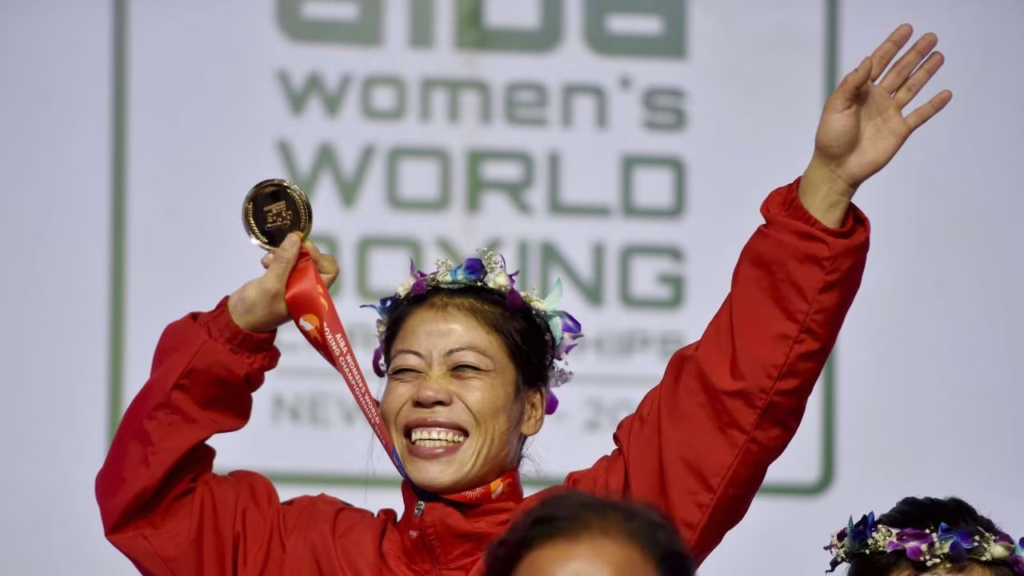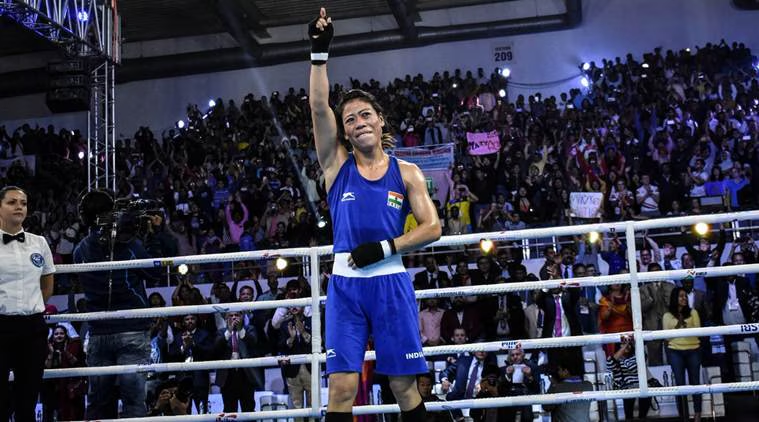MARY KOM
“If you want to fly, give up everything that weighs you down.”
Mary Kom faced many challenges on her journey to becoming one of the greatest female boxers in the world. Coming from a small village in Manipur, India, she struggled with poverty and limited access to proper training facilities and resources. As a woman in a male-dominated sport, she had to overcome societal stereotypes and lack of support for female athletes.
Balancing family responsibilities with her rigorous training was another major challenge. After getting married and having children, Mary Kom had to fight even harder to return to competitive boxing. Injuries and financial difficulties also tested her determination.
Despite these obstacles, Mary Kom’s relentless spirit, hard work, and passion helped her break barriers, win multiple World Championships, and become an Olympic medalist, inspiring millions of women worldwide.

Mary Kom was born on March 1, 1983, in Kangathei, a small village in Churachandpur district, Manipur, India. Her full name is Mangte Chungneijang Mary Kom. She grew up in a poor family. Her parents, Mangte Tonpa Kom and Mangte Akham Kom, were tenant farmers who worked in the fields, and Mary often helped them with farming work from a young age.
Despite their financial struggles, Mary was very active in sports. She was interested in athletics, especially javelin and running, but after being inspired by Manipuri boxer Dingko Singh, she decided to take up boxing.
She started training secretly in boxing because she was afraid her parents might not support it at first. Eventually, when her talent became clear, her family began supporting her journey.
Mary Kom began gaining attention through her outstanding performances in local boxing competitions in Manipur. Even though women’s boxing was not widely accepted at the time, her determination and skill quickly made her stand out.
In her early competitions, she competed against older and more experienced opponents. Despite being younger and less experienced, Mary showed exceptional speed, strength, and focus, which impressed local coaches and boxing officials.
Her breakthrough came in 2000, when she won the Manipur State Women’s Boxing Championship. That same year, she also won a gold medal at the Regional Championship in West Bengal, which brought her into the national spotlight.
These early victories at the state and regional level helped her get selected for national camps, where she began receiving formal training. This marked the beginning of her journey toward becoming an international boxing champion.

INTERNATIONAL CAREER
In 2001, Mary Kom made her international debut at the AIBA Women’s World Boxing Championships in Scranton, Pennsylvania, USA. She competed in the light flyweight (48 kg) category and showcased her exceptional skills and determination. Despite being a newcomer on the global stage, Mary advanced through the rounds with confidence and resilience. She eventually won the silver medal, becoming the first Indian woman boxer to achieve such a feat at a world-level tournament. This moment was not only a personal breakthrough but also a historic moment for Indian women’s boxing, as it brought much-needed attention to the sport and to Mary as a rising talent.
Determined to improve and hungry for gold, Mary returned to training with greater discipline and intensity. In 2002, she participated in the second edition of the AIBA Women’s World Boxing Championships, held in Antalya, Turkey. This time, she was even more prepared, and her focus paid off—Mary won the gold medal, becoming a World Champion at just 19 years old. Her performance was praised both in India and abroad, and it helped establish her as one of the most promising female boxers in the world. This win also encouraged other Indian women to take up boxing, seeing her as a role model.
Between 2003 and 2005, Mary Kom consistently participated in international tournaments and kept building her reputation. In 2003, she won gold at the Asian Women’s Boxing Championships, further solidifying her dominance in the continent. She also participated in several invitational tournaments and friendly series, where she displayed great adaptability against international opponents. She trained hard to improve not only her speed and footwork but also her tactical intelligence inside the ring.
In 2004, although there was no World Championship, Mary continued to train intensively and remained active in various camps and competitions to stay in top form. Her efforts bore fruit in 2005, when she once again competed at the AIBA Women’s World Boxing Championships—this time in Podolsk, Russia. She successfully defended her world title and won her second World Championship gold medal. Winning two world titles in just four years was a rare accomplishment and proved her consistency and dominance.
During this time, Mary faced many challenges outside the ring. Being a woman boxer from a remote region like Manipur meant limited access to world-class facilities, equipment, and financial support. She often had to train with basic gear, and sometimes even had to travel without proper backing. Yet, her passion for the sport and the support from her early coach K. Kosana Meitei kept her going. Later, the involvement of coach Charles Atkinson and support from the Sports Authority of India gave her more exposure to international training methods and strategies.
By the end of 2005, Mary Kom had already become a household name in Indian sports. She was a two-time World Champion, had won multiple Asian titles, and had proven that with talent, discipline, and courage, even a girl from a small village could reach the top of the world. Her early international career laid a strong foundation for the many achievements she would earn in the years to come.
MARRIAGE AND COMEBACK
Mary Kom got married to Onler Kom in 2005. After her marriage, she faced the challenge of balancing her personal life with her boxing career. Many people doubted whether she could continue competing at the highest level after starting a family. However, Mary was determined to prove them wrong. She took a short break from boxing to focus on her family but never gave up on her passion for the sport. She made a remarkable comeback in 2008, returning stronger and more motivated than ever. Her dedication paid off when she won the gold medal at the 2010 Asian Women’s Boxing Championships and continued to achieve success in several international tournaments.
After the birth of her first child in 2011, Mary faced one of the biggest challenges of her life—returning to competitive boxing while managing motherhood. Many doubted if she could come back to top form after delivery, but Mary was determined to prove them wrong. She worked hard to regain her fitness and boxing skills, balancing training with caring for her child. Her dedication and perseverance paid off when she won a gold medal at the 2012 Asian Women’s Boxing Championships and then went on to win a bronze medal at the 2012 London Olympics, becoming the first Indian woman boxer to win an Olympic medal. Mary continued to compete successfully in international tournaments, including multiple World Championships and Asian Games, proving that motherhood did not slow her down.
Mary Kom’s ability to manage both motherhood and a demanding sports career has inspired many, showing that with determination and support, it is possible to overcome personal challenges and continue to excel professionally. Her comebacks after marriage and after giving birth have been some of the most celebrated moments in her career, highlighting her resilience and commitment to boxing.
2013-PRESENT
After her remarkable comeback following marriage and childbirth, Mary Kom continued to compete at the highest level with unwavering determination. In 2013, she won the gold medal at the Asian Women’s Boxing Championships, proving that her time away from the sport had only made her stronger. She kept adding to her medal tally in various international events, including multiple AIBA Women’s World Boxing Championships, where she consistently remained among the top contenders.
Mary qualified for the 2016 Rio Olympics, marking her second Olympic appearance. Although she did not win a medal there, her performance was commendable, and she continued to inspire millions by showing that age and personal responsibilities do not limit one’s dreams. Her discipline, training, and perseverance helped her maintain top form even as younger athletes entered the field.
In 2018, Mary Kom won a bronze medal at the World Boxing Championships held in New Delhi, adding yet another prestigious accolade to her illustrious career. She continued to actively participate in major tournaments, including the Asian Games and Commonwealth Games, often reaching the podium and representing India with pride.
Mary also qualified for the 2020 Tokyo Olympics, which were held in 2021 due to the COVID-19 pandemic. Competing against the world’s best, she gave a strong performance and made it to the quarterfinals, further showcasing her skill and experience on the global stage.
Apart from her sporting achievements, Mary Kom has been a vocal advocate for sports, women’s empowerment, and youth development. She became a member of the Rajya Sabha, India’s upper house of parliament, where she has worked to promote sports infrastructure and support for athletes across the country. Mary has also been involved in several government and private initiatives encouraging girls and women to take up sports professionally.
Despite the physical challenges that come with age, Mary’s commitment to fitness and training has been exemplary. She has adapted her training methods and lifestyle to stay competitive, showing that with the right mindset and effort, athletes can extend their careers successfully.
By 2025, Mary Kom’s legacy is firmly established. She is celebrated not only for her six World Championship gold medals and Olympic bronze but also for her role as a trailblazer for Indian women in sports. Her story continues to motivate young athletes from every corner of the country, symbolizing resilience, dedication, and the power of dreams fulfilled against all odds.
Beyond her achievements in the ring, Mary Kom is admired for her resilience, determination, and ability to balance her personal life with her demanding sports career. She has inspired millions, especially women, by proving that with hard work and perseverance, it is possible to overcome challenges like financial struggles, societal expectations, and motherhood to reach the highest levels of success.
More Photos







